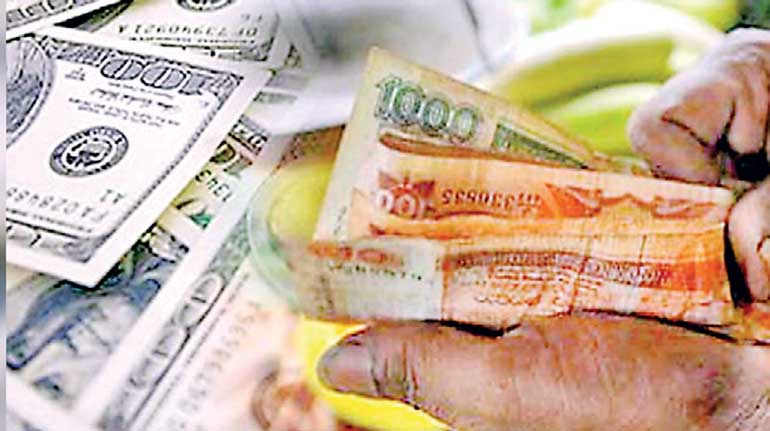Monday Feb 16, 2026
Monday Feb 16, 2026
Tuesday, 13 July 2021 02:52 - - {{hitsCtrl.values.hits}}

It is time that we either produce our own plans and program to face this situation or resort to immediate assistance available as debt service relief from possible sources
 Amidst the growing concerns about the sinking economy, the battle at play, between some of the economic wizards from both the Opposition and the Government on the subject matter, has turned into an interesting stage.
Amidst the growing concerns about the sinking economy, the battle at play, between some of the economic wizards from both the Opposition and the Government on the subject matter, has turned into an interesting stage.
The message we get indicates that the conclusions of the debaters are at great variance like the N and S poles. Opposition spokesmen categorically state that there is no in-between solace for the falling economy other than the assistance from IMF while the State batsmen maintain that we can face up to the situation by inward policy adjustments.
In the context we the innocent spectators, rather the affected and victimised under the circumstances, are compelled to at least console ourselves by referring to the existing realities elsewhere in the planet we live in. Hence this concise account of amalgamation of relevant information from authenticate sources.
The facilitations from the IMF are made available in a multi-pronged approach. In addition to the normal financing arrangements for reforms and development, considered under different criteria, IMF has adopted new strategies to work closely with its member countries to provide emergency financing needs to protect the lives and livelihoods of the people.
The most recent normal financing arrangement was the adoption and introduction in 2018 of a Framework for Enhanced Engagement on Governance. In its implementation process the IMF has had very intimate and close dealings with the member countries on reforms and issues related to governance and anti-corruption. The discussions with the member countries take place through;
Followed by research and outreach in the areas covered under the programs.
IMF outlook towards the pandemic crisis
Let us take a look at the pronounced IMF policy guideline on the COVID-19 issue.
“COVID-19 is causing tragic loss of life and has disrupted economies and societies on a scale that we have not seen in living memory. The IMF is working closely with its members to meet their need for emergency financing, while sustaining its fight against corruption and the misuse of urgently needed resources. In this time of crisis, it is more important than ever to ensure that IMF financing is used to protect lives and livelihoods.”
In the wake of the COVID-19 pandemic, the IMF continues to address governance and corruption vulnerabilities in member countries. The IMF is working to balance the need for immediate COVID-19 financing against appropriate accountability and transparency to ensure, as best as possible, that financial help reaches those in need. IMF emergency financing is provided in upfront, outright disbursements. With much relaxed normal conditionality in the context of emergency financing, the IMF ensures its resources are used for their intended purpose by implementing the following:
As some of the basic prerequisites the IMF has asked member countries requesting emergency assistance towards COVID-19 related matters to commit to:
On the face of it and in the eyes of the public all these appear to be quite normal and easy requirements to comply with. But for some it looks like most of these requirements and conditions are paving the way for exposure of many shortcomings in our governance and accountability and opening the doors of cupboards with skeletons. Many of the things mentioned in the IMF process as matters coming under their purview are often questionable areas for us that have become highly critical with focused public concern.
We wonder whether these are the reasons to shun the IMF and the Government instead resorting to desperate makeshift arrangements for financing the ever-widening gap. On the other hand, is it the reason why the Opposition is pressing the Government to go to IMF so that they could gain political mileage with the possible exposures that would follow and inevitable restrictions that may be imposed?
According to the current facilities available and policy arrangements the IMF is providing financial assistance and debt service relief to member countries facing the economic impact of the COVID-19 pandemic. IMF has approved from March 2020 under its various lending facilities and debt service relief financed by the Catastrophe Containment and Relief Trust (CCRT). Overall, the IMF is currently making about $ 250 billion, a quarter of its $ 1 trillion lending capacity, available to member countries.
Borrowing countries commit to undertake governance measures to promote accountable and transparent use of these resources when they borrow under the COVID-19 relief arrangements.
Between the period March 2020 to January 2021, nine low-income countries in the Asia and Pacific have obtained a total of $ 2,226.88 million as assistance under the IMF Rapid Financing instrument and Rapid Credit facility for COVID-19 relief.
29 lower income countries from different parts of the world have received in three tranches of Debt Service Relief amounting to $ 726.75 million during this same period.
Whatever is the outcome or the objective of the internal political war between parties, Sri Lanka’s worst problem is the debt service burden. Irrespective of who is responsible for allowing it to grow to this magnitude, we are today among the few nations of the low-income developing countries facing a serious financial stability risk.
It is time that we either produce our own plans and program to face this situation or resort to immediate assistance available as debt service relief from possible sources. When we examine the sources, we come across the following;
IMF, emergency facilities—such as Rapid Credit Facility (RCF) and Rapid Financing Instrument (RFI)—providing assistance to member counties during the crisis.
The IMF has extended debt service relief through the Catastrophe Containment and Relief Trust (CCRT) to vulnerable member countries on their IMF obligations, covering debt falling due to the IMF for the period between April 2020 and mid-October 2021, also project the duration to be extended to up to a two-year period, ending April 2022.
The G20 responded to a call of the IMF on 15 April 2020, by agreeing to suspend repayment of official bilateral credit from the poorest countries until the end of 2020, was extended until end 2021.
The IMF has approved the establishment of a Short-term Liquidity Line (SLL) to further strengthen the global financial safety net.
The facility is a revolving and renewable backstop for member countries with very strong policies and fundamentals in need of short-term moderate balance of payments support.
The IMF is augmenting existing lending programs to accommodate urgent new needs arising from the pandemic, thereby enabling existing resources to be channelled to the necessary spending on medical supplies and equipment and for containment of the outbreak.
In addition to the financial support, IMF is also extending policy advice services to recommend policies needed to overcome the crisis, protect the most vulnerable and set the stage for economic recovery.
All these point towards the need to move forward with the global trends. Countries will have to be open to the global developments. This unprecedented human catastrophe demands unified action and the flexibility to mobilise universal support. Our policies should be more carefully tailored with proper advice.
As IMF Managing Director Kristalina Georgieva noted ahead of the April 2021 IMF/World Bank Annual Meetings: “The global economy is on firmer footing as millions of people benefit from vaccines. But while the recovery is underway, too many countries are falling behind and economic inequality is worsening. Strong policy action is needed to give everyone a fair shot—a shot in the arm to end the pandemic everywhere, and a shot at a better future for vulnerable people and countries.”
In this trying time, let us resolve to choose the best suited instead of choosing what is best for some.